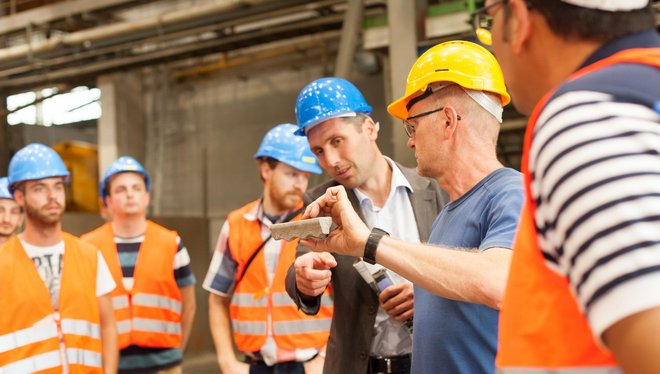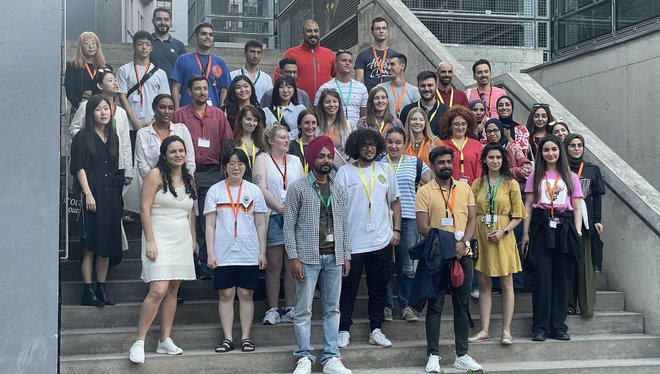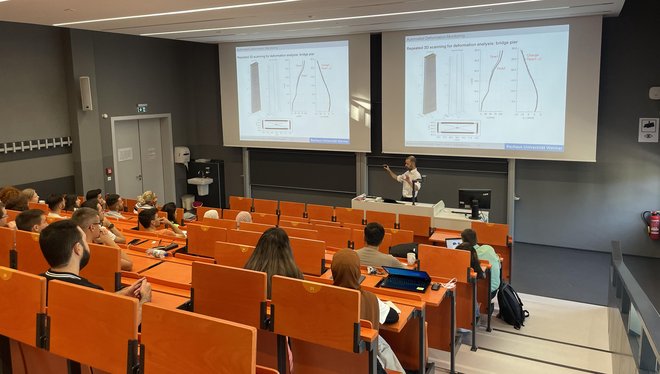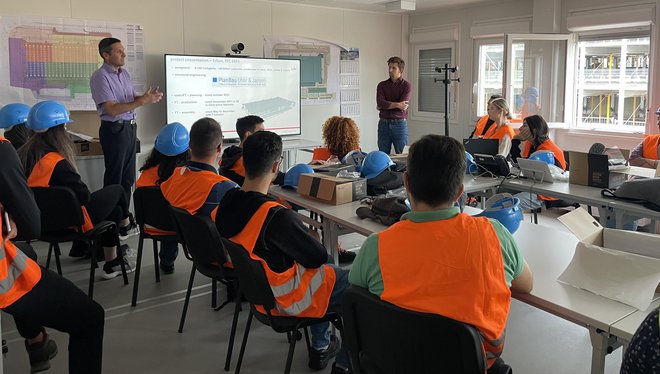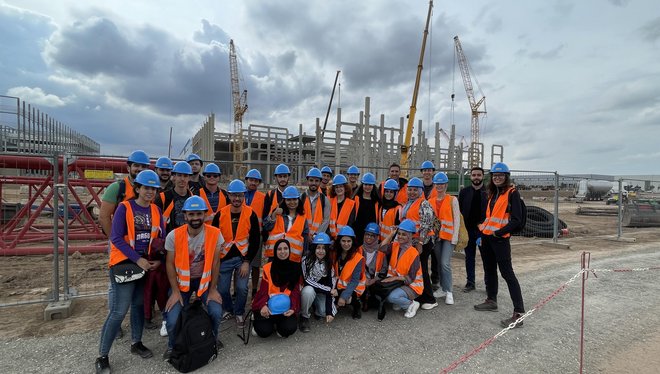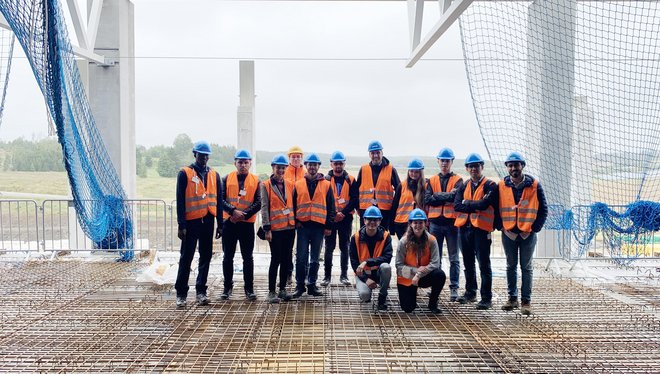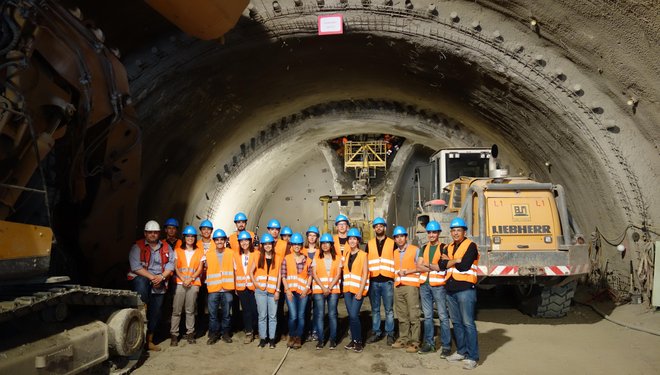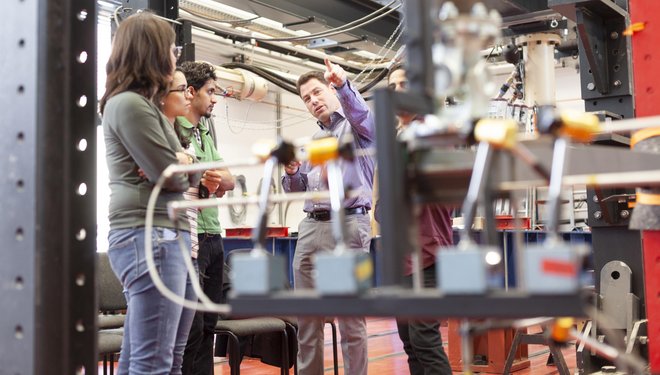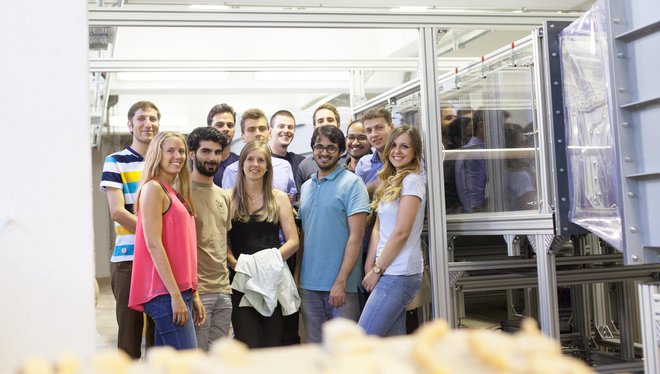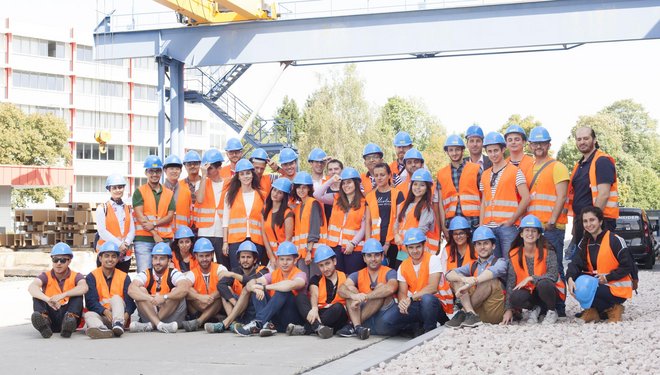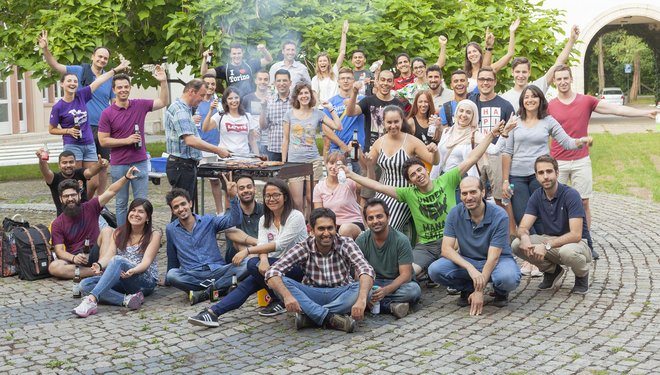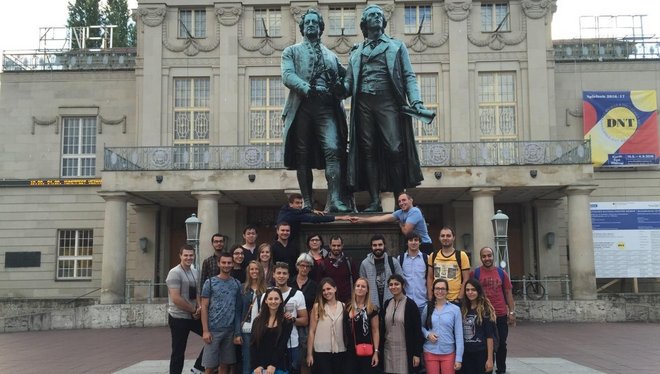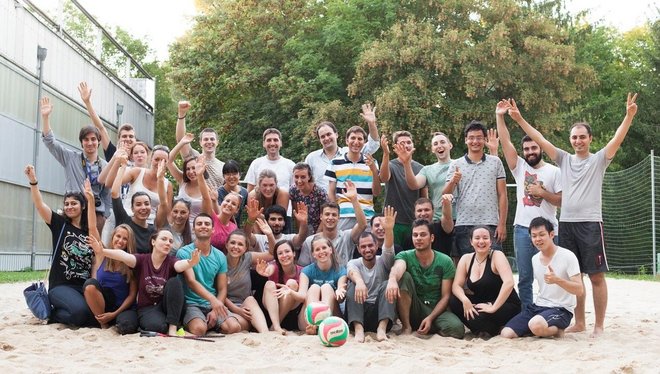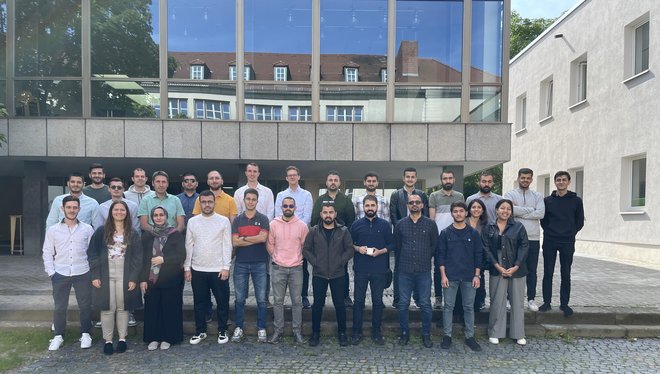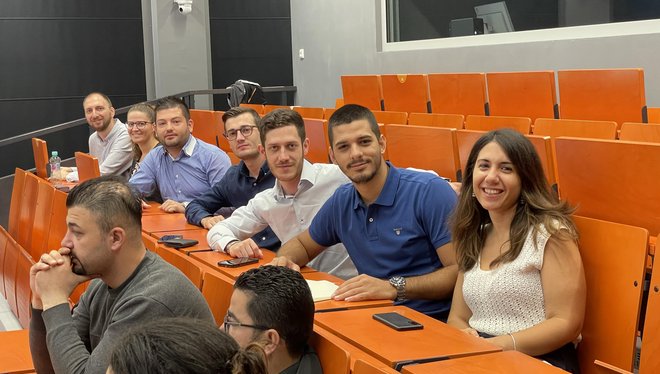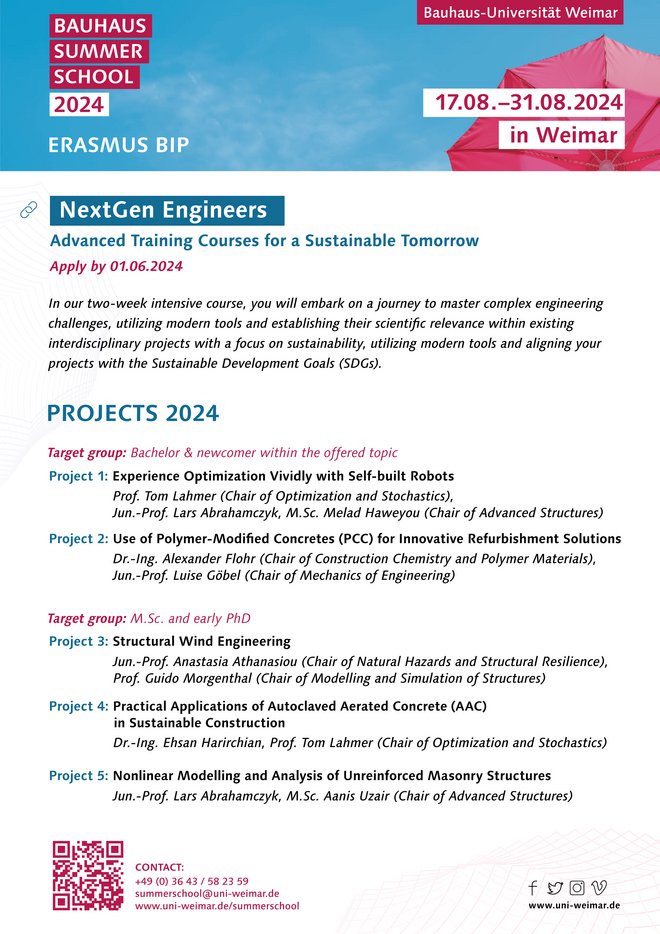In 2023, the course was attended by international students from Iraq, Brazil, Croatia, Hungary, Italy, Macedonia, Portugal, Serbia, and Slovenia.
Projects
- Project 1 | Use of Polymer-Modified Concretes (PCC) for Innovative Refurbishment Solutions | Alexander Flohr (Chair of Construction Chemistry and Polymer Materials)
- Project 2 | Modelling of large deformations in geotechnical engineering | Patrick Straubach (Chair of Geotechnics)
- Project 3 | Nonlinear modelling and analysis of unreinforced masonry structures | Lars Abrahamczyk, Aanis Uzair (Chair of Advanced Structures)
Keynote Lectures
- Prof. Dr. A. Athanasiou (BUW) | Performance based design of steel buildings in combined wind and earthquake enviroments
- L. Moschen (EBNER-ZT), F. Falkner (MCI) & Ch. Meinhardt (GERB) | Tuned Mass Dampers in Highly Sensitive Environment – Theory and Practical Application
- Prof. Dr. N. Saeed (TIU) | Stress and Deformation Control of Structures
- Prof. Dr. D. Penava (UNIOS) | On the mechanical behavior of masonry infilled RC frames
- Dr. L. Nguyen Tuan (BUW) | Structural Health Monitoring Using Inverse Analysis in Application to the Masonary Dams
- A. Wakoya Gena (BUW) | Optical schlieren techniques for visualization of indoor airflows
- Dr. Jan Machacek (TU Darmstadt) | Seismic hazard assessment of large opencast mine slopes in the Rhenish lignite mining area
- Prof. Dr. C. Koch (BUW) | Building information modeling (BIM)
Student Presentations
- Junaid Ahmed | Engineering geopolymer composite (EGC)
- Nemanja Krtinić | Experimental and Numerical Investigation of the Seismic Response of Confined Masonry Walls
- Petra Prašnikar | Evaluating the applicability of contemporary seismic retrofitting techniques on post war structures in Slovenia
- Daniel Tomikj | Seismic assessment of existing RC building
- Rafael Anjos | Nature inspired micro reinforcement of coarse granular aggregates
- Shna Abdulkarim | Non‐linear structural analysis technique based on flexibility method by Pade approximants
- Szabolcs Szinvai | Structural behaviour of concrete members with embedded fibre reinforced polymer (FRP) bars
- András Horváth | Welding simulation and measurement of normal and high strength steel box sections
- Chiara Patanè | Seismic improvement of a INA Casa building: application of exoskeletons and study of new functional solutions
- Michele Milesi | The critical role of floor diaphragms in the seismic retrofit of existing buildings
Project Posters
- Project 1 | Twana S. Zahawy, Luisa D. Araujo, Aram Sami, Parwar Ahmad, Hana Khalid Ahmed, Ahmad Salah Jamal, Shkar Mohammed Hayas, Junaid Ahmed, Twana Ahmed Hussein
- Project 2 | Lucas Paiva, Luka Virovkic, Rafael Anjos, Szabolcs Szinvai
- Project 3 | Nemanja Krtinić, Petra Prašnikar, Daniel Tomikj, Jovan Trajchevski, Chiara Patanè, Michele Milesi, Luca Danesi
In 2022, the course was attended by international students from Palestine, Egypt, Iraq, Turkey, Cyprus, Croatia, Macedonia, Romania, Bulgaria, Hungary and Italy.
Projects
- Numerical simulation of 3D-scanned structures
- Simplified non-linear analysis of unreinforced masonry walls with irregular opening layouts
- Use of Polymer-Modified Concretes (PCC) for Innovative Refurbishment Solutions
- Reliability based design optimization in Civil Engineering
Keynote Lectures
- Dr. N. Kovács (BME) | Ultimate behaviour of innovative composite structures
- Prof. V. Rodehorst (BUW) | Imagebased 3D modelling and anomaly detection using Unmanned Aircraft Systems (UAS)
- Dr. D. Duma (UPT) | Building Information Modeling (BIM) in civil engineering
- Dr. C. Kalender (RUB) | Virtualization and validation of wind effects arround building structures
- Dr. L. Moschen / Prof. A. Sextos | Evaluating the dynamic performance of buildings exposed to ground-borne vibrations: predictions, measure-ments and validation
- A. Wakoya Gena & L. Becher (BUW) | Optical schlieren techniques for visualization of indoor airflows
- Dr. V. Zabel (BUW) | Structural Dynamics and System Identification
Student Presentations
- Saman Khataei | BIM based Innovative Construction Workflow Simulations for Productivity Improvement
- Filip Glibo & Marin Valinčić | The evaluation of the earthquake performance of cultural heritage Castle Trakošćan (Croatia): A preliminary analysis
- Mohammad Radwan | An enhanced design approach for global and local buckling resistance of welded box section columns
- Nathalie Eid | Simplified numerical model development for advanced design of lightweight concrete encased cold formed steel compressed elements
- Eser Çabuk | Performance Comparison of Different Isolator Nonlinear Models
- Savvinos Aristeidou | Ground motion directionality effects on inelastic spectral displacements
- Wajdi Mefleh | Investigation of composite slim floor system analysis and design
In 2021, the course was attended by international students from Italy, Portugal, Macedonia, Romania, Bulgaria, Egypt, Palestine, and Nigeria.
Projects
- Building information modeling (BIM) in Engineering Design
- Assessment of unreinforced masonry structures under extra ordinary horizontal action
Keynote Lectures
- Prof. T. Lahmer (BUW) | Introduction to a reliability based design optimization
- Dr.-Ing. A. Flohr (BUW) | Use of polymer-modified concrete for innovative refurbishment solutions
- Ch. Buschow (BUW) | How digitalization drives new organizational forms
- Prof. R. Apostolska / Prof. V. Shendova (IZIIS) | Large scale shake table experiments of RC and masonry buildings
- L. Becher (BUW) | Optical schlieren techniques for visualization of indoor airflows
- Prof. V. Rodehorst (BUW) | Image-based 3D modelling and anomaly detection using unmanned aircraft systems (UAS)
- Dr. L. Göbel (BUW) | Experimental and analytical multiscale modeling approaches of functionalized concrete
- B.Somodi (BME) | FEM-based design of steel structures
- Prof. M. Kraus (BUW) | Stability verifications of steel members based on numerical simulations
Student Presentations
- Femi Oyetayo | Effective use of BIM in construction project management
- Volkan Ozsarac | Probabilistic seismic assessment of RC bridges using simulated records
- Inês Bourgeois | Assessment of vernacular construction structures under extraordinary horizontal action
- Maja Gosheva | Experimental and numerical analysis of the behaviour of un-strengthened and strengthened masonry with re-grouting
- Mohammed Safwat | Quality check of building information models

